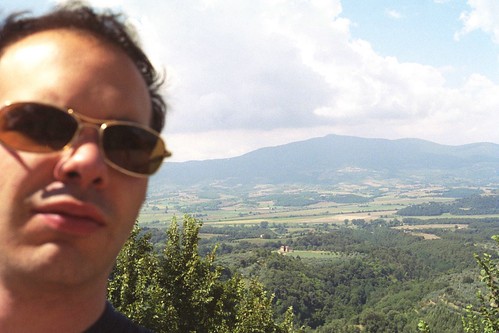
So gmail provided an interesting link in the advertisement section next to the body of a recent e-mail. I typed a short message of concern for a friend, "I hope everything is alright. I know you're busy, but let me know how you're doing when you get the time."
Gmail uses an ingenious algorithym which scans the words of an e-mail for clues which generate the most appropriate advertising links. Apparently this system is one of the worlds most advanced methods of gathering and organizing information.
Next to the body of my concerned e-mail, I couldn't help but notice what Gmail concluded from my two sentences of concern. A single, lonely link was posted: Desperate?
The word, colored in blue hypertext font strangely reminded me of an Alice in Wonderland trip ---take the blue pill--- but you can never return.
Desperate?
Surrounded by troubles?
Overcome by problems?
If you want to see how to save a hopeless situation,
See below
I was only mildly surprised that there was no obvious place to click and send money. What are they selling? Drugs? Books? Videos?
But I went along reading, down a small ladder of logic that was designed to make the reader feel as though their pains are common to most humans.
I often wondered why I respond to a situation the way I respond. Interestingly, I have responded to the same event in different ways at different times, to the extent that one response can be opposite to the previous response. Why?
I have searched for answers. Nothing seems to be final, but I think it is something to do with my beliefs. If my belief about the situation changes, my response changes, even if the situation is the same.
Very systematic...
Why do I choose to believe the way I believe? Most times it is based on experience of the same type of situation in the past and whether it was beneficial to me.
To believe one way or to believe another way is merely a decision based on my belief at that point in time.
Why do I believe what I believe? Because I decide to do so. Making a choice is a decision. I can choose to decide I no longer believe in what I used to believe in. I can choose to believe in something else, even the opposite.
Can I believe in anything? Yes, I merely decide to believe in it.
Am I free to decide to believe in anything? I believe I am free to do so.
I believe that any belief is only one decision away.
Of course this gets to the nature of the question: what is belief?
Belief is created through reasoning and perception whether consciously or unconsciously. The idea that one can choose what to believe is surely a curious position. It stands that if one chooses what to believe, then human reason must have the ability to compartmentalize. For instance, one could reason that all reality is simply temporary beliefs, or an acceptance that patterns will continue uninterrupted until proven otherwise, at which time the belief changes to include the new patterns. But one could also reason that basing one's idea of reality on ever changing beliefs creates an unstable environment which may make one uncomfortable. Since a human may strive for comfort, it is reasonable that one may choose to believe in a steady, unchanging reality in order to maximize comfort and therefore productivity, health, etc.
This is a case in which reason provides two very opposite conclusions once compartimentalized to include the benefits to the one doing the reasoning.
Notice the brilliant encoding of the writer's position in the last few lines highlighted. "Can I believe in anything? Yes, I merely decide to believe in it. Am I free to decide to believe in anything? I believe I am free to do so. I believe that any belief is only one decision away.
The suggestion is that one could take advantage of the maleable nature of belief. The structure of the essay has so far been:
1. Are you depressed? It is likely due to your outlook.
2. Your outlook is based on a system of beliefs.
3. Although beliefs are created through reason, it is compartimentalized reason.
4. The choices you make will adjust the outcome of your reason.
This begs the obvious question. What is one choosing from?
1. Feel good.
2. Feel bad.
Suppose I tell you a fantastic story. It is fantastic because even by stretching my imagination, it sounds too good to be true. But why not hear me out. It may prove to be interesting.
The writer then goes on to explain, quite concisely, the Old Testament's story of creation followed by the history of man leading up to the Messiah.
A few parts are real gems:
There is a catch to this story. Who the creator chooses to hear and to believe this story is entirely up to the creator. Selection is entirely by grace or favor. Nothing I do or don’t do can influence the creator to select me. Interestingly, the selection has already taken place at the foundation of the universe.
Once I believe this story, I stop fearing death. I am enabled by an agent of the creator called holy spirit to focus on the creator’s son, Yeshua. Holy spirit enables me to cast all my cares to Yeshua. When I meet up with a problem, my attitude is as follows. “Hey! I didn’t ask to be created, so it is not my responsibility to solve this problem. Therefore, Yeshua, please take over.”
The extent that this attitude is employed is the extent of peace of mind I enjoy. The problem may not change immediately but the burden of responsibility is instantly lifted off my shoulders. Many a time, circumstances change and the problem shifts from appearing as a curse to appearing as a blessing.
Should I believe this story?
What if it is fiction?
So what?
What do I have to lose?
What I find particularly interesting is the existence of choice. But the nature of this choice may be very different from one person to the next. Those who acknowledge that their beliefs are based on a reasonable conclusion, whether conscious or not, that every belief originated from some evidence (how much or little depending on the individual's degree of skepticism)and some reasonable sorting of information from there on out, may find this choice to be... well...
humane.
To make rational decisions which are chosen to best serve the characteristics of the human require special study of the human. Yet how does one best understand the nature of a human, as a human? Some say that the study of archetypes reveal universal patterns of desire and fear, therefore revealing deep rooted human characteristics. Some say that intuition is our truest knowledge, and a quieting of the rational mind is in order.
Then some say: everything in moderation.
*gulp*







